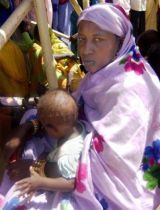Some find hope after horror of Darfur
By MOHAMED OSMAN, Associated Press Writer
NYALA, Sudan, Feb 19, 2005 (AP) — Violence in Darfur killed 13 members of Fatima Mohamed Ali’s family. She saw some of them hanged, others set alight. But last week Mohamed Ali, cradling her 1-year-old daughter Amuna in her lap, joined hundreds of others who had fled Darfur’s fighting at a reconciliation ceremony organized by the government.

|
|
Fatima Mohamad Ali, 27, holding her 1-year-old daugher, Amuna, attends a tribal reconciliation conference held outside of Nyala in the Darfur region of Sudan, Saturday, Feb. 19, 2005. Six tribal groups including her own Tarjam tribe, said they would forget the past and write off blood money for the many killed among their tribes. (AP). |
As Mohamed Ali watched, leaders of six local tribes signed what officials hope will be a model agreement to stop fighting each other and drop all claims for blood money stemming from past assaults.
If such agreements are to be anything more than pantomimes arranged for journalists and foreign dignitaries, those who have suffered must embrace the spirit of reconciliation. Mohamed Ali says she is willing to forgive to stop the cycle of attack and counterattack.
“This kind of thing will help us a lot, God willing, in many ways,” she said. “Reconciliation is good for all us.”
The challenges are daunting. The ceremony near Nyala, 800 miles southwest of Khartoum, lacked the usual displays of joy there was no singing, dancing or slaughtering of beasts. Instead, spectators were watchful and tense, though some cheered when the agreement was signed.
“We have suffered a lot and we would not like to see our sons suffer the same,” Mohamed Ali said. “When our elders agree, everybody will follow.”
While the government organized the reconciliation ceremony and pledged to bring calm to Darfur, the United Nations, the United States and international human rights groups have accused it of fanning the violence. Addressing the underlying causes of the conflict rivalries and resentment stoked by years of competition over scarce resources will take money and commitment. Darfur’s patchwork of tribes, some split by the fighting, adds to the complexity.
After years of small clashes, Darfur erupted into large-scale violence in early 2003, when rebels of ethnic African tribes took up arms, complaining of discrimination by the Arab-dominated government in Khartoum.
The government is accused of responding by backing ethnic Arab militia, known as Janjaweed, who launched a scorched-earth policy against villages where the rebels may have found support. The United Nations has accused the government and the Janjaweed of widespread human rights abuses, and recommended war crimes trials.
The United States says genocide has occurred in Darfur.
No firm estimate of the direct toll of the war exists. International aid agencies estimate more than 70,000 Darfur refugees have died, mostly from disease and malnutrition, since March.
Mohamed Ali is among the more than 2 million people forced from their homes by the violence, either to refugee camps in neighboring countries or camps for the displaced like the one where the reconciliation ceremony was held near Nyala.
Mohamed Ali and her husband fled her village in the Shairia region, south of Nyala, more than a year ago. Their daughter was born in Mosse, one of four displaced-persons camps in the Nyala area.
“Hopefully my daughter will not see the horrors I personally saw,” Mohamed Ali said.
